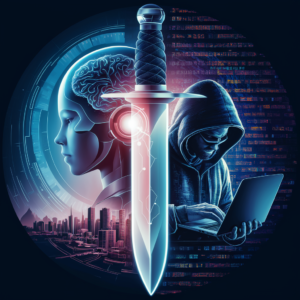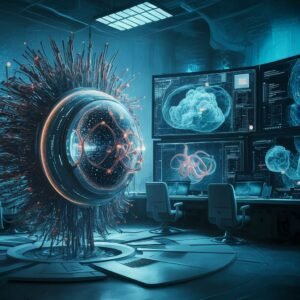Artificial Intelligence (AI) has made remarkable strides in recent years, raising questions about how it compares to human intelligence and whether they can complement each other. While AI has made great strides in areas such as data analysis, pattern recognition, and automation, human intelligence remains unparalleled in its ability to understand context, think creatively, and experience emotions. In this article, we’ll explore the distinctions and synergies between AI and human intelligence.
Understanding Artificial Intelligence (AI)
AI refers to the simulation of human intelligence processes by machines, typically computer systems. AI systems can perform tasks that typically require human intelligence, such as visual perception, speech recognition, decision-making, and language translation. Here are some key attributes of AI:
- Data-Driven: AI relies on vast amounts of data and uses algorithms to identify patterns, make predictions, and improve performance over time.
- Task-Specific: AI systems are often designed for specific tasks. For example, machine learning models can be trained to recognize objects in images or translate languages.
- Rapid Processing: AI can process vast amounts of data quickly, making it invaluable for tasks like data analysis, recommendation systems, and automation.
Understanding Human Intelligence
Human intelligence is a complex and multifaceted cognitive ability that encompasses problem-solving, reasoning, learning, emotional understanding, and adaptability. It’s marked by qualities such as creativity, empathy, intuition, and common-sense reasoning. Here are some key attributes of human intelligence:
- Contextual Understanding: Humans can understand context, nuances, and the emotional states of others. They can adapt their behavior accordingly.
- Creativity: Humans can generate new ideas, art, and solve problems in innovative ways. Creativity is driven by imagination, emotions, and empathy.
- Learning and Adaptation: Human intelligence is not static but dynamic. Humans learn from experiences, apply knowledge, and adapt to changing circumstances.
Distinctions Between AI and Human Intelligence
While AI has made significant progress, it still falls short in several key areas when compared to human intelligence:
- Lack of Contextual Understanding: AI often struggles to understand context, sarcasm, humor, and emotional states. Human intelligence excels in interpreting these nuances.
- Limited Creativity: AI is capable of generating creative outputs based on patterns it has learned, but it lacks true creativity and the ability to think “outside the box.”
- Lack of Empathy: AI lacks true emotional understanding and empathy, which are integral to human intelligence and crucial in fields like psychology, counseling, and caregiving.
- Dependency on Data: AI’s capabilities are limited by the quantity and quality of data it receives. It cannot operate effectively in data-scarce or novel situations.
Synergies Between AI and Human Intelligence
Rather than viewing AI and human intelligence as competitors, many experts see the potential for synergy. Here’s how they can complement each other:
- Automation: AI can handle repetitive, data-driven tasks, allowing humans to focus on more complex, creative, and strategic aspects of their work.
- Data Analysis: AI can process and analyze vast datasets, providing valuable insights that humans can use to make informed decisions.
- Enhanced Creativity: AI tools can assist humans in creative tasks, offering suggestions or generating art, music, or content based on learned patterns.
- Efficiency: AI can enhance productivity and efficiency in various fields, from healthcare diagnosis to financial analysis.
- Education: AI can personalize and optimize the learning process, providing tailored educational experiences and freeing up educators’ time for individualized instruction.
Conclusion
AI and human intelligence have distinct strengths and limitations. While AI excels in data analysis, automation, and certain pattern recognition tasks, human intelligence offers contextual understanding, creativity, empathy, and adaptability. Rather than viewing them as adversaries, the integration of AI and human intelligence can lead to powerful synergies, allowing both to work together to tackle complex problems and enhance various aspects of our lives, from healthcare and education to business and entertainment. Understanding the unique qualities of each and how they can complement each other is key to harnessing the full potential of both AI and human intelligence.





